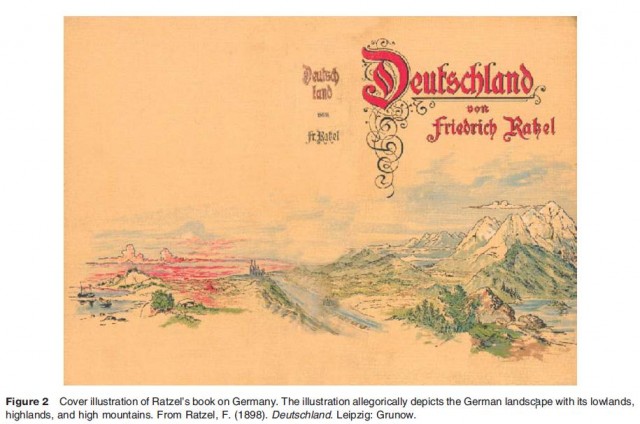Competing Geographical Imaginations
Ratzel argued that the state as spatial organism 'naturally' seeks to grow beyond a given area. Due to an increase in population which he regards as being ultimately dictated by the laws of nature, the space need of a state organism would grow. The resulting tendency of the state to require – and acquire – new territory is a core idea in Ratzel's anthropogeography which led him to formulate his 'law of the growing areas' (Gesetz der wachsenden Raume, varied as Gesetz der Zunahme der politischen Raume, Gesetz des ra?umlichen Wachstums der Staaten und Volker). At the same time, however, Ratzel realized that the surface of the Earth was limited, offering virtually not enough space for never ending and unbounded growth. Reflecting on the contradiction between the 'law of the growing areas', on the one hand, and the fact that the Earth's territory is limited, on the other hand, Ratzel believed in the existence of a constant 'struggle for space':
Between the flow of life, which is never at rest, and the territory of the earth, which remains constant, there is a contradiction. Out of this contradiction the struggle for space is born. Life quickly subdued the ground of the earth, but when it had reached its limits it flowed back, and since this time life struggles with life for space everywhere and ceaselessly. The much misused, and even more misunderstood expression 'the struggle for existence (Dasein)' actually means first of all a struggle for space. For space is the very first condition of life, and it is space which serves as measure for all other conditions, above all aliment. (Ratzel, 1901, 165 168, transl. JL)
Against the background of the 'struggle for space', Ratzel never lost sight of a second, and rather different, geographical imagination. Both in line with and contra dictory to the 'law of the growing areas', his anthropogeography entails the idea of 'natural lands' (Lander) which, in turn, represent the demarcated territories of (supposedly) socially homogenous entities or nationstates. The idea of a 'natural land' figures, for instance, in Ratzel's definition of the state as an organic whole which, for him, developed out of the interaction between a specific group of people and the discrete territory the group occupies – Ein Stuck Menschheit und ein Stuck Boden, as he famously wrote (Ratzel, 1903: 4). According to this more bounded imagination, the bonding of the group depended not so much on ethnic or racial kinship but on the shared relationship to the land. This is an important point which is further underlined in Ratzel's definition of the Volk as ''a politically united group made up of groups and individuals, who need neither to be related ethnically nor linguistically, but who through their common territory (Boden) are also spatially linked together'' (Ratzel, 1903: 5).
In accordance with the second imagination, Ratzel disapproves of what can be called arbitrary boundaries, that is, boundaries which violate the laws of nature. While the passion for expansion, for Ratzel, necessarily leads to a transgression of natural boundaries, it is nevertheless impossible to fully overrule the related natural land: The ''right to particular [i.e. individual] development as it is given in the forms of the earth's surface'' is said to counter the striving for growing areas of exchange as well as growing states (Ratzel, 1903: 207). For Ratzel, ''the multi structured earth wants multi structured political entities, and the earth's many limbs, with silent violence, continuously break through the uniformity aiming at covering the heterogeneity of the earth'' (ibid.; see Figure 2 for an example of a natural Land).

- Darwinian Concepts
- Is Geography an Independent Discipline?
- Tracing Anthropogeography in Ratzel’s Work and Life
- Friedrich Ratzel
- Anthropogeography (After Ratzel)
- Antarctica: Conclusion
- Growing Focus on Biological Prospecting
- Imagining Antarctica as a World Park: Regulating Tourism
- Antarctica as a ‘Natural Reserve’ Devoted to Peace and Science: Since the 1990s